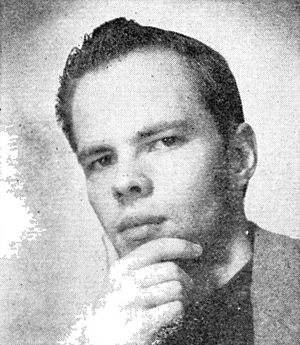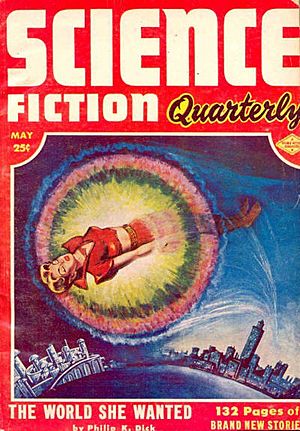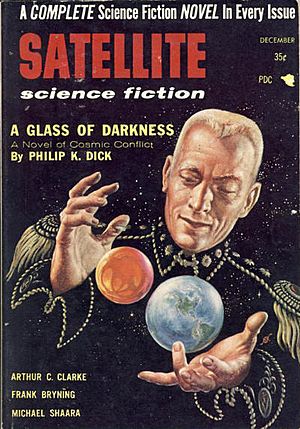Philip K. Dick facts for kids
Quick facts for kids
Philip K. Dick
|
|
|---|---|
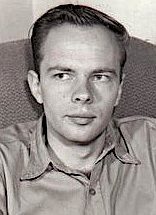
Dick in the 1960s
|
|
| Born | Philip Kindred Dick December 16, 1928 Chicago, Illinois, U.S. |
| Died | March 2, 1982 (aged 53) Santa Ana, California, U.S. |
| Pen name |
|
| Occupation | Writer: novelist, short story writer, and essayist |
| Period | 1951–1982 |
| Genre | Science fiction, paranoid fiction, philosophical fiction |
| Literary movement | Postmodernism |
| Notable works |
|
| Spouse |
|
| Children | 3; including Isa |
| Signature | |
Philip Kindred Dick (born December 16, 1928 – died March 2, 1982) was an American science fiction writer. People often called him PKD. He wrote 44 novels and about 121 short stories. Most of his stories appeared in science fiction magazines.
His books often asked big questions like "What is real?" and "Who are we?". His characters often faced strange worlds, powerful companies, or strict governments. Many people think he was one of the most important science fiction writers of the 1900s.
Dick was born in Chicago. He moved to the San Francisco Bay Area when he was young. He started publishing science fiction stories in 1952, at age 23. He became famous when his book The Man in the High Castle (1962) won a Hugo Award. He was 33 years old then.
He wrote other popular science fiction novels like Do Androids Dream of Electric Sheep? (1968) and Ubik (1969). His 1974 novel Flow My Tears, the Policeman Said won another award.
Later in his life, Dick's books explored ideas about religion and reality. Examples include A Scanner Darkly (1977) and VALIS (1981). He died in 1982 in Santa Ana, California, at age 53, after a stroke. After his death, he became known as a master of imaginative, paranoid fiction.
Many popular films are based on his works. These include Blade Runner (1982), Total Recall (made in 1990 and 2012), and Minority Report (2002). TV shows like The Man in the High Castle and Electric Dreams are also based on his stories.
In 2005, Time magazine called Ubik one of the 100 greatest English novels since 1923. In 2007, Dick was the first science fiction writer added to The Library of America series.
Contents
Early Life and Education
Philip K. Dick and his twin sister, Jane Charlotte Dick, were born early on December 16, 1928. They were born in Chicago, Illinois. Their parents were Dorothy and Joseph Edgar Dick. Jane died six weeks after they were born. This sad event deeply affected Philip. The idea of a "phantom twin" often appeared in his books.
Dick's family later moved to the San Francisco Bay Area. When he was five, his parents divorced. Philip lived with his mother. She took a job in Washington, D.C., and they moved there. Philip went to John Eaton Elementary School. A teacher said he was good at "story telling".
In 1938, Philip and his mother returned to California. Around this time, he became very interested in science fiction. He said he read his first science fiction magazine in 1940.
Dick attended Berkeley High School. He was in the same class as another famous science fiction writer, Ursula K. Le Guin. However, they did not know each other then.
He went to the University of California, Berkeley for a short time in 1949. He took classes in history, psychology, and philosophy. He left college because of anxiety. He also did not like the required military training.
Through his studies, he thought that what we see as "real" might not be real at all. He believed that our existence depends on how we see things inside our minds. This idea became a major theme in many of his novels.
Writing Career and Success
Starting as a Writer
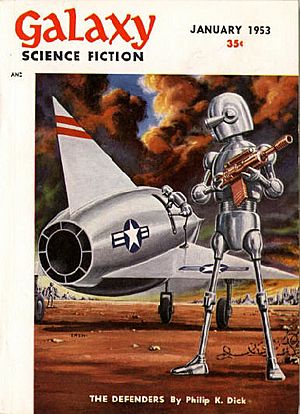
Dick sold his first story, "Roog", in 1951. He was 22 years old. The story was about a dog who thought garbagemen were stealing food. After that, he wrote full-time.
His first science fiction stories appeared in magazines like Planet Stories and If in 1952. His first novel, Solar Lottery, was published in 1955.
The 1950s were a tough time for Dick. He often struggled with money. He mostly published science fiction. But he really wanted to be a mainstream writer. He wrote many non-science fiction novels, but most were not published during his lifetime. Only one, Confessions of a Crap Artist, came out in 1975.
In 1963, Dick won the Hugo Award for The Man in the High Castle. Even though he was a genius in science fiction, the mainstream literary world did not appreciate him much. He still had money problems even in his later years.
Personal Life and Family
Philip K. Dick was married five times:
- Jeanette Marlin (1948)
- Kleo Apostolides (1950–1959)
- Anne Williams Rubinstein (1959–1965)
- Nancy Hackett (1966–1972)
- Leslie "Tessa" Busby (1973–1977)
He had three children. Their names were Laura, Isolde (Isa), and Christopher.
In 1955, the FBI visited Dick and his second wife, Kleo. They believed it was because of Kleo's political views.
Dick's third wife, Anne, and he often argued. Dick wrote that they had "dreadful violent fights". In 1963, Dick told his neighbors his wife was trying to harm him. She was sent to a psychiatric hospital for two weeks.
Political Views
Early in his life, Dick went to some Communist Party meetings. But over time, his views changed. He became more against communism and supported libertarianism. He once called himself a "religious anarchist".
Dick usually tried to stay out of politics. This was especially true during the Vietnam War. However, he did show some feelings against the war and the government. In 1968, he joined a protest. He pledged not to pay U.S. income tax because of the war. This led to the government taking his car.
Dick was critical of the U.S. federal government. He thought it was as bad as the Soviet Union. He wanted the government to have less power. His political ideas sometimes appeared in his books. For example, his 1967 story "Faith of Our Fathers" criticizes communism. His 1968 novel Do Androids Dream of Electric Sheep? speaks out against the idea of improving humans by controlling who can have children.
Later Life and Death
On February 17, 1982, Dick finished an interview. He then called his therapist, saying his eyesight was failing. He was told to go to a hospital right away, but he did not go. The next day, he was found unconscious at home. He had suffered a stroke.
On February 25, 1982, he had another stroke in the hospital. This led to brain death. Five days later, on March 2, 1982, he was taken off life support.
After his death, Dick's father took his ashes to a cemetery in Fort Morgan, Colorado. Philip was buried next to his twin sister Jane. Her tombstone had both their names on it 53 years earlier. Philip died four months before the movie Blade Runner was released. This film was based on his novel Do Androids Dream of Electric Sheep?.
Pen Names and Other Works
Dick used two different names for some of his stories. These were Richard Phillipps and Jack Dowland. "Some Kinds of Life" was published in 1953 under the name Richard Phillipps. This was because the magazine did not want to publish too many stories by the same author in one issue.
The short story "Orpheus with Clay Feet" was published as Jack Dowland. In this story, a character wants to be the inspiration for a fictional author named Jack Dowland. This fictional Dowland is considered the best science fiction author of the 20th century. In the story, Dowland publishes a short story called "Orpheus with Clay Feet" under the name Philip K. Dick.
The name Dowland comes from a Renaissance composer named John Dowland. This composer is mentioned in several of Dick's works. For example, the title Flow My Tears, the Policeman Said refers to Dowland's famous song "Flow, my tears".
Selected Novels and Their Themes
For a complete list of his works, see Philip K. Dick bibliography.
The Man in the High Castle (1962) tells a story where the Axis powers (like Germany and Japan) won World War II. They now rule the United States. This is the only novel by Dick to win a Hugo Award. In 2015, Amazon Studios made it into a TV series.
The Three Stigmata of Palmer Eldritch (1965) uses many science fiction ideas. It shows different layers of reality. It is also one of Dick's first books to explore religious themes. The story takes place in the 21st century. Humans have colonized planets and moons in our Solar System. Life there is hard and boring for most colonists.
Do Androids Dream of Electric Sheep? (1968) is about a bounty hunter who hunts down androids. It takes place on a dying Earth where most animals and successful humans have left. The only people left are those who cannot leave the planet. This novel was the basis for the film Blade Runner (1982). It asks a key question: "What is real, what is fake? What makes humans truly 'alive'?"
Ubik (1969) uses ideas like mind powers and a state after death. These create a world where reality is falling apart. A group of psychics investigates a rival group. But some of them seem to be killed by a bomb. The story then jumps between different possible realities. In 2005, Time magazine listed it among the "All-TIME 100 Greatest Novels".
Flow My Tears, the Policeman Said (1974) is about Jason Taverner, a TV star in a future police state. After an attack, Jason wakes up in a hotel room. He has his money, but his ID cards are gone. This is a big problem because police checkpoints are everywhere. Anyone without ID is arrested. Jason soon finds that his whole identity has been erased. No one knows him, not even his friends. He has to find out what happened while avoiding the police. This novel won the John W. Campbell Memorial Award for Best Science Fiction Novel.
A Scanner Darkly (1977) mixes science fiction with a police story. It was made into a film by Richard Linklater.
VALIS (1980) is one of Dick's most personal novels. It explores his own strange experiences. It is also one of his most studied works. It was even made into an opera. The word VALIS stands for Vast Active Living Intelligence System. Dick later thought VALIS was a "reality generator" and a way for aliens to communicate.
Dick wrote an 8,000-page journal called the Exegesis. He wrote in it from 1974 until his death in 1982. A main idea in the Exegesis is Dick's belief that history stopped in the first century AD. He thought the "Empire never ended". He saw Rome as a symbol of control and materialism. He believed VALIS communicated with him to help remove U.S. President Richard Nixon. Dick thought Nixon was like the current Roman Emperor.
In a 1976 interview, Dick said A Scanner Darkly was his best work. He felt he had "finally written a true masterpiece".
Adaptations of His Works
Many of Dick's stories have been made into films and TV shows. Dick himself wrote a screenplay for a movie version of Ubik in 1974, but it was never made. Many film adaptations do not use Dick's original titles. His ex-wife Tessa said that editors often changed his titles. She said Phil often commented he "couldn't write good titles".
Films Based on His Stories
- Blade Runner (1982): Based on Do Androids Dream of Electric Sheep?. Directed by Ridley Scott. Dick was amazed by the special effects. He said the future Los Angeles looked "exactly as how I'd imagined it!". He fully supported the film before he died.
- Total Recall (1990): Based on "We Can Remember It for You Wholesale".
- Screamers (1995): Based on "Second Variety".
- Minority Report (2002): Based on "The Minority Report".
- Impostor (2002): Based on "Impostor".
- Paycheck (2003): Based on his short story of the same name.
- A Scanner Darkly (2006): Based on his novel of the same name. This film used a special animation style called rotoscoping.
- Next (2007): Loosely based on "The Golden Man".
- The Adjustment Bureau (2011): Loosely based on "Adjustment Team".
- Total Recall (2012): A second film version of "We Can Remember It for You Wholesale".
- Blade Runner 2049 (2017): A sequel to the 1982 film Blade Runner.
Television Shows Based on His Stories
- The Man in the High Castle (2015–2019): An Amazon Prime Video series based on his novel. It was very popular.
- Minority Report (2015): A TV show sequel to the 2002 film. It was cancelled after one season.
- Philip K. Dick's Electric Dreams (2017): A 10-part TV series. Each episode was based on a different Dick story.
Other Adaptations
- His works have been adapted for the stage, including an opera called VALIS.
- Radio dramas of his stories like "Mr. Spaceship" and "The Defenders" have aired.
- Marvel Comics adapted his short story "The Electric Ant" into a comic series in 2009.
- BOOM! Studios published a comic book adaptation of Do Androids Dream of Electric Sheep? starting in 2009.
- Some of his early works are available as ebooks for free from Project Gutenberg and Wikisource.
Awards and Recognition
The Science Fiction Hall of Fame welcomed Dick in 2005.
He received many awards and nominations during his life:
- Hugo Award for Best Novel:
- 1963 – Winner: The Man in the High Castle
- John W. Campbell Memorial Award for Best Novel:
- 1975 – Winner: Flow My Tears, the Policeman Said
- British Science Fiction Association Award for Best Novel:
- 1978 – Winner: A Scanner Darkly
Philip K. Dick Award
The Philip K. Dick Award is a science fiction award. It is given each year to the best original paperback science fiction novel published in the U.S. It started in 1983, the year after Dick died. The award helps recognize new and exciting science fiction writers.
Images for kids
See also
 In Spanish: Philip K. Dick para niños
In Spanish: Philip K. Dick para niños
- Cyberpunk
- Paranoid fiction


